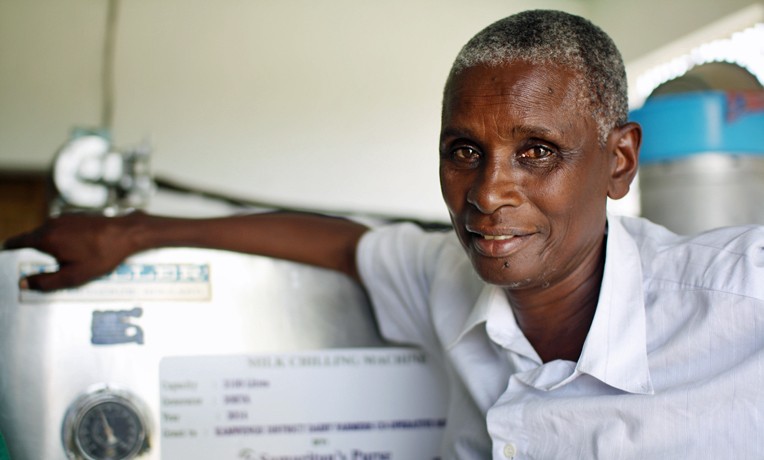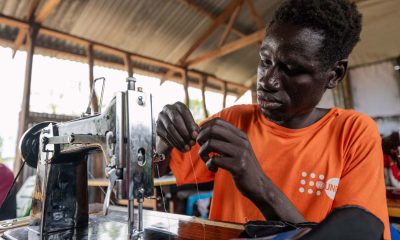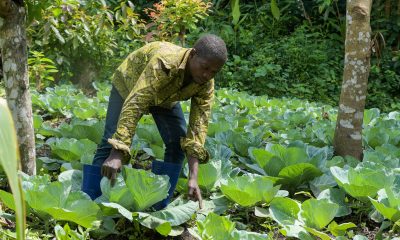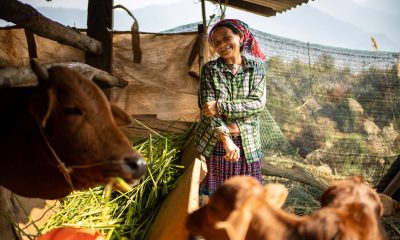With the help of Samaritan’s Purse, farmers in Uganda have created a business to sell milk
What does it take to succeed as a dairy farmer in Western Uganda? According to Moses, the Program Manager of Samaritan’s Purse Uganda’s Western Livestock Program, the answer is relatively simple: “You must put a lot of effort in. No compromising.” For the dairy association Moses helps oversee, this principle has proven true.
Samaritan’s Purse began the Western Livestock Program nearly 10 years ago at a time in Ugandan history when there were many vulnerable families and refugees along the Congolese/Ugandan border due to severe warring in the Democratic Republic of the Congo. Many struggled to find sources of livelihoods that their families could survive on.

Moses Bogere is the Western Livestock Project Manager for Samaritan’s Purse Uganda.
Samaritan’s Purse responded to the need by distributing milk cows. A few years later, as dairy farmers grew in number, Samaritan’s Purse also helped start a dairy association where farmers could sell milk for a fair wage. Just last year, Samaritan’s Purse helped the association purchase a milk cooler so the milk can be stored in bulk and sold to large-scale milk suppliers, helping the association build sustainability. The dairy association has been a huge success.
A Day with Dairy Farmers
One of the best parts of my job is visiting projects, asking questions, and glimpsing into the lives of so many unique and wise people.
Several weeks ago, my assignment was to go to Western Uganda to shadow Moses and learn about the Western Livestock Program and the success of the dairy association. Moses and I had spent the morning traveling by dirt bike through the hilly rural Kamwenge district visiting farms.
As we went, Moses taught me about dairy farming.
“We don’t train by saying, ‘When you do this, this will happen,’” Moses had told me as we’d chatted in his office that morning. “We train on the farm.”

This cow is named Joy. Tom, an elderly beneficiary, said, ”I picked that name because I enjoy it’s milk and I wanted it to be different from other common [cow] names.”
He was taking the same approach with me. Together we traipsed across pastures to check on cows, inspected animal shelters that Samaritan’s Purse had taught farmers to construct, and advised farmers on how to continue improving their pastures and cattle shelters.
Moses told me that the black and white spotted Friesian cross cows from Samaritan’s Purse are a valuable asset to dairy farmers because they produce an average of eight liters of milk a day, in comparison to the roughly two cups a day the local cows give. Samaritan’s Purse has given out more than 300 cows through the program, empowering farmers in livelihood development. With cows that give healthy milk in excess, families can have milk to drink and extra milk to sell.
Dairy Association Think Tank
Our final stop of the day was the milk collection center.
A gray-haired Ugandan man invited us into the office where the Kamwenge District Dairy Farmer’s Co-operative committee was waiting for our visit.
Moses and I sat around a wooden table in a cement office with tidy mint green trim with them.

People who receive cows from Samaritan’s Purse are required to give back the first calf their heifer produces as payment. The calf can then be given to another community member, widening the impact and creating sustainability within the Western Livestock Program.
“Ask them whatever you want,” Moses had told me. “These are the brains, the think tanks of the association.”
The farmers beamed as they shared with me the story of how Samaritan’s Purse had helped them start the dairy, how they’d grown from 32 members to more than 300 members, and about the recent launch of the milk cooler that will help them build sustainability. They keep detailed records of how much milk each farmer sells and at what price.
“Dairy farming techniques and procedures aside, what would you tell a young person in your community it takes to be successful?” I asked.
As Moses taught me about dairy farming, I’d realized that simply giving a family a cow doesn’t automatically lead to a better life. Samaritan’s Purse has helped many farmers by giving them an opportunity to succeed but, in the end, it’s the farmers who have worked hard for their success.
Wisdom for Success
Moses translated my question into the local language. The men thought only briefly before sharing with me their wisdom about what it takes to succeed not only in dairy farming but also in life:
- Be Christ centered first
“First, believe in Christ and enjoy him,” the men told me. Though not everyone in the association is a follower of Christ, the leaders of the association are committed to making sure it is Christ who gets the glory for what they do. “Here we pray,” said John, the chairman. “You cannot start any business without praying.” God guides all their business, and all the glory goes back to Him.
- Behave well
While many young men and women in the village spend their young adult lives living boisterously, drinking and wasting money, the elders said they always advise young people to put their time and energy toward education and improving their lives and the lives of their families. Using the life you’ve been given well leads to success.
- Respect others
I could tell this was a piece of wisdom the men sitting at the table lived by. It had been a crucial part of the dairy’s success as the leaders listened to and learned from the suggestions and input from Samaritan’s Purse staff members. “Every advice you give,” Moses had told me, “they explore it.” They never see themselves as too good to learn or too important to listen to and respect the people around them.
- Work hard
The life of a dairy farmer is hard work. There is no denying that. All the farmers in the association had woken up early that morning to milk cows, guide them to pasture, and take milk to be sold at the collection center. At the collection site, the milk testers had checked the quality of every single batch of milk the farmers brought that morning before adding it to the milk cooler. Being an excellent dairy farmer and running a successful dairy association is a commitment to work hard.
Moses predicts that soon the dairy association will be completely sustainable with no need for the support of Samaritan’s Purse. The leaders of the association have wisely led and developed the dairy and are widely respected in their region by neighbors and government officials alike. As the dairy continues to grow and influence the community of Kamwenge District, we’re praying they will continue to succeed in brining God glory—no compromising.






